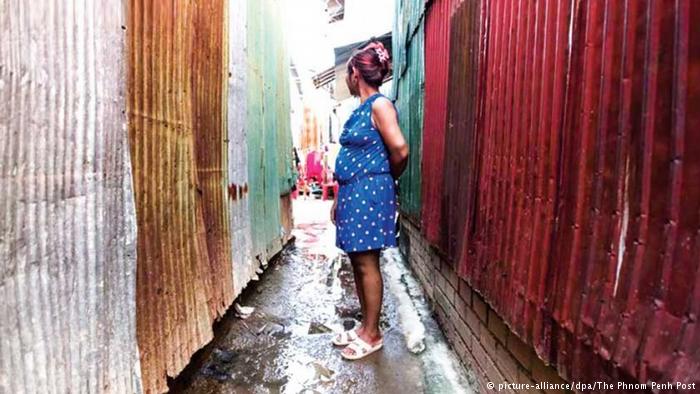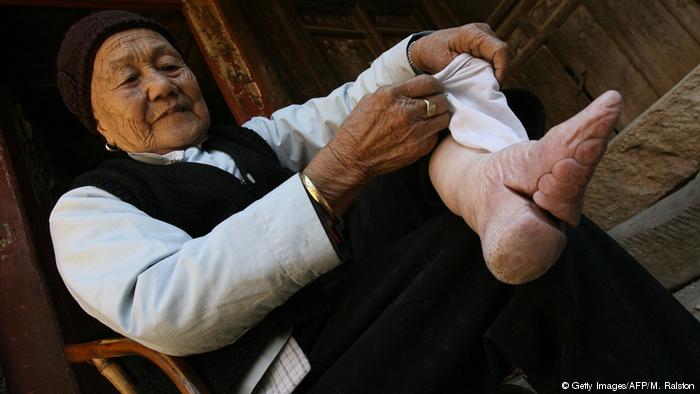Uighur journalist Gulchehra Hoja: ‘I have my own sad story to tell’
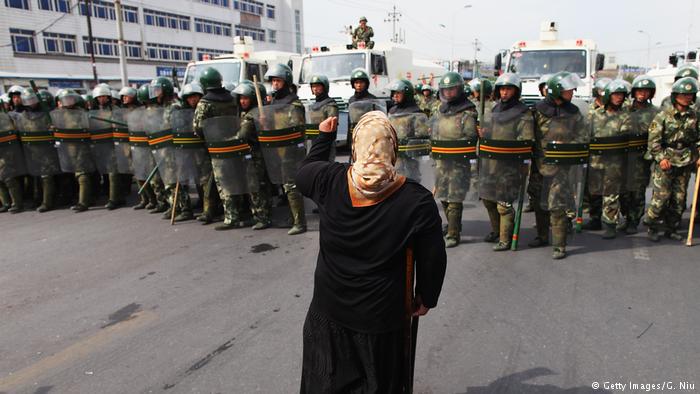
DW spoke to Uighur journalist Gulchehra Hoja who, along with some of her colleagues, accuses the Chinese authorities of arresting her family members as retribution for her reports about the plight of the Uighurs.
Radio Free Asia (RFA), a US government-funded broadcaster, last week accused the Chinese government of trying to silence and intimidate its Uighur service journalists, following reports that security forces had detained several of their close relatives.
According to RFA, the Chinese government’s broad campaign against the families of its staff came in retaliation to the broadcaster’s coverage of Beijing’s crackdown against the ethnic Uighur people in the northwestern Xinjiang province.
Gulchehra Hoja, who has worked with RFA in Washington DC for 17 years, said that around 20 of her relatives had been seized by Chinese security forces. Among those arrested were her mother, father, brother, and other relatives.
In a DW interview, Hoja spoke about how she refuses to be intimidated by the Chinese authorities and will continue to draw the world’s attention to the problems faced by the Uighur community.
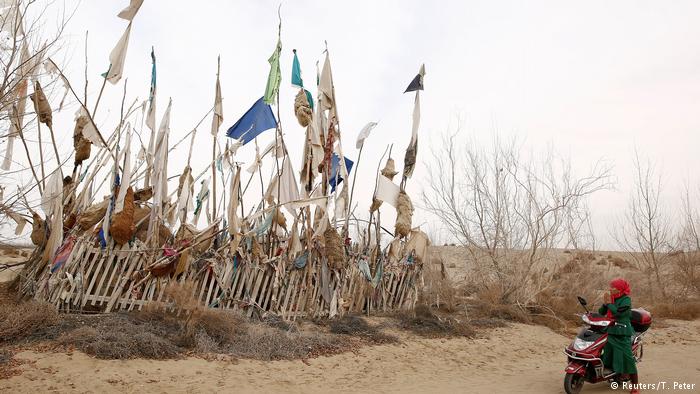
A woman prays at a grave near the tomb of Imam Asim in the Taklamankan Desert. Uighurs are a Turkic-speaking distinct and mostly Sunni Muslim community and one of the 55 recognized ethnic minorities in China. Although Uighurs have traditionally practiced a moderate version of Islam, experts believe that some of them have been joining Islamic militias in the Middle East.
DW: You have accused the Chinese authorities of imprisoning your mother, father and other relatives because of your work as a reporter. How do you assess the current political situation in Xinjiang and do you fear retribution as a result of your actions?
Gulchehra Hoja: The situation in the region is now worse. Every day we’re publishing news about the deteriorating state of affairs there. Over the past couple of years, thousands of people have been arrested by the government and put in so-called re-education centers. But these centers are just like concentration camps. We just know that Uighurs get in, but nobody gets out.
In recent months, I have been focusing on reporting about these camps. And I have published others’ sad stories on a daily basis, but right now I have my own sad story to tell.
I am extremely worried about my parents and their health. This affects not just me, but the entire Uighur community. Every family in the region has one or two members in such camps. These people cannot speak up, but I can. We, the free press, are their only voice left.
I therefore need to be strong and continue with my work. We don’t know where exactly the authorities have taken my parents and relatives and what their present condition is.
They’re blocking all information and contact with the outside world and we hardly know what’s going on. But what I can do is draw attention, not only to my family’s situation but also to that of my entire community. I hope the world can turn its attention to the problem and take necessary action to help us.
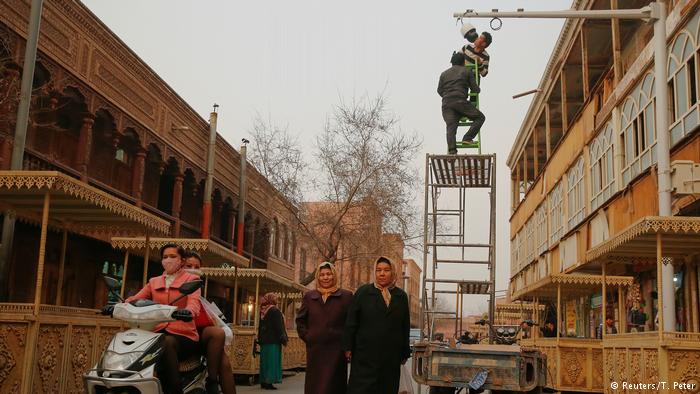
Many residents say the anti-terror drills are just part of an oppressive security operation that has been ramped up in Kashgar and other cities in Xinjiang’s Uighur heartland in recent months. For many Uighurs it is not about security, but mass surveillance. “We have no privacy. They want to see what you’re up to,” says a shop owner in Kashgar.
Reports suggest that these detentions are much more extensive than previous ones. What is your take on this and what conditions are the detainees likely facing in custody?
I last spoke to my mother on February 1. Until then, I had been talking to her once or twice a month and the authorities didn’t cut off our communication. But now I don’t know where they are and it’s so scary to imagine the miserable conditions they might be facing in detention. Both my mother and father have health issues.
My brother was taken by the authorities almost five months ago. He was taken on September 28, 2017, and they said he was targeted because of my work. After knowing about it, I wanted to do something to help my brother. But my mother stopped me saying that she had already lost one child and didn’t want to lose another. But now the Chinese authorities have taken my whole family, including my cousins.
What, in your view, should be done to secure the release of your parents and relatives?
This question should be answered by human rights groups and Western countries who believe in human rights and justice. It has to be answered by whomever that has relations with China. All the countries and their governments already know the plight of the Uighurs. Many news agencies and international organizations regularly publish reports about the Uighurs.
I am just one person and doing what I can do. But I cannot stop the Chinese government. This is the responsibility of China’s allies and business partners. The world should focus on resolving this problem. This is the 21st century, but we’re still watching innocent people being arrested, accused and put into concentration camps. This is so sad.
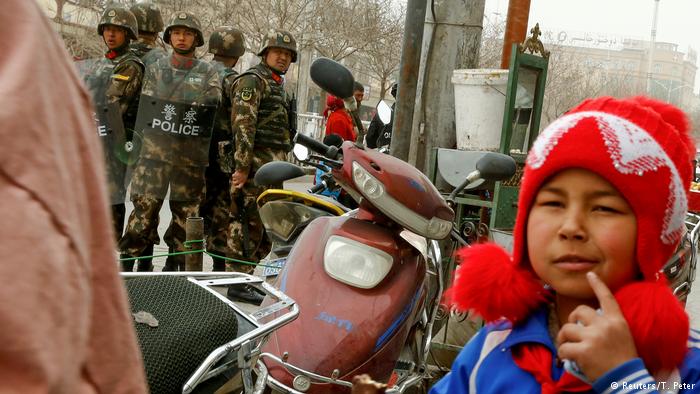
Authorities offer rewards for those who report “youth with long beards or other popular religious customs that have been radicalized”, as part of a wider incentive system that rewards actionable intelligence on imminent attacks. Human rights activists have been critical of the tactics used by the government in combatting the alleged extremists, accusing it of human rights abuses.
How has the authorities’ move affected you and your work? How are your colleagues reacting to the detentions of their family members?
I am a human, too. When I heard the news of these arrests, I immediately felt crushed. But I believe I am their hope and I cannot just stop my work.
Five of my colleagues are also facing the same situation, with their parents and siblings being taken away by the authorities just because of our work at Radio Free Asia. Some of them have been even sentenced to many years in prison.
The Chinese government perhaps wants us to stop raising issues about Uighurs and publishing the truth. That’s why our relatives have been targeted. But we cannot and will not stop, especially at a time when we feel our work is extremely important in highlighting the plight of Uighurs.
What threats do journalists covering developments in Xinjiang face from Chinese authorities?
The Chinese government can do anything it wants in the Uighur region. Outsiders cannot even imagine what’s going on there. Even though my colleagues and I are abroad, we have been affected by the Chinese government’s policy as our relatives and friends still live there.
I think the region is closed to the outside world. The Chinese government doesn’t let journalists go in there. If Uighurs talk to journalists, they will be arrested or face difficulties. That’s why even if journalists get the opportunity to enter the area, no one is going to talk to them, especially right now. So it’s very difficult to get credible information from there.
Gulchehra Hoja has been working for US government-funded Radio Free Asia in Washington for the past 17 years.
The interview was conducted by Srinivas Mazumdaru. It has been edited and condensed for clarity.





